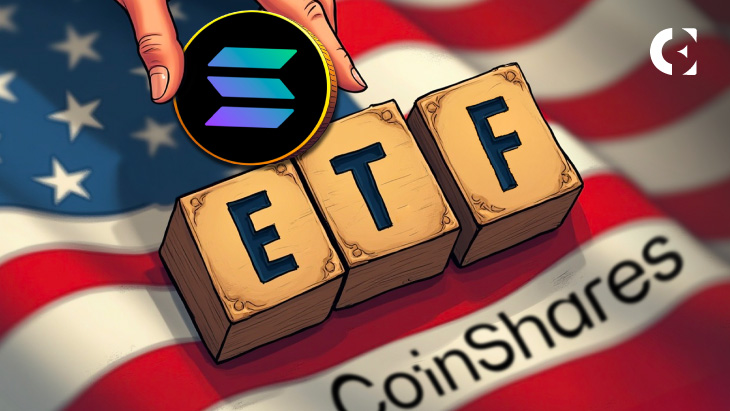- CoinShares registers Solana staking ETF entity in Delaware, signaling U.S. market intent.
- Proposed ETF aims to merge PoS staking rewards with traditional ETF accessibility.
- Regulatory approval faces hurdles amid SEC scrutiny of staking and altcoin ETFs.
Asset manager CoinShares has taken a formal step toward launching a proposed Solana (SOL) staking exchange-traded fund (ETF) in the U.S. by registering a new corporate entity in Delaware, state filings show.
The move represents an early but significant step in bringing a new type of crypto-based financial product to American markets.
How the Proposed Solana Staking ETF Works
The proposed fund’s structure would combine features of a traditional ETF with Solana’s Proof-of-Stake (PoS) protocol. If approved, the product would hold SOL tokens and actively stake them on the Solana network to earn rewards. These staking rewards could then be distributed to investors, either through an increase in the ETF’s net asset value (NAV) or via direct payments.
Related: The Race for a Spot Solana ETF Intensifies as European Giant CoinShares Files in the US
This ETF format would allow shares to trade on established stock exchanges, providing institutions and individuals with easier access to Solana exposure without the need to manage their own digital wallets or navigate staking protocols directly.
Targeting Institutional Investors
Industry analysts view CoinShares’ decision to establish the entity as a signal of confidence in Solana’s growing role in digital finance.
Related: CoinShares Launches First-Ever SEI Token ETP With a “Zero-Fee, 2% Yield” Model
The firm’s approach aims to lower the barrier to entry for institutional investors, such as pension funds and endowments, who have often avoided direct crypto investments due to regulatory and operational complexities.
Regulatory Considerations and Advocacy for Liquid Staking
Despite the registration, the path toward regulatory approval remains unclear. The U.S. Securities and Exchange Commission (SEC) has been cautious about crypto ETFs, especially those involving altcoins and staking features.
Key factors under scrutiny include the legal classification of SOL, treatment of staking rewards, investor protections, and requirements for secure custody of underlying assets. The ETF must also address the risks of “slashing,” which can cause losses if validators misbehave or experience downtime.
Elsewhere in the asset management industry, firms like BlackRock are seeking permission to integrate staking into existing spot Ethereum ETFs. Meanwhile, several organizations, including Jito Labs, VanEck, Bitwise, the Solana Policy Institute, and Multicoin Capital, are actively urging regulators to allow liquid staking in Solana-based ETPs.
Disclaimer: The information presented in this article is for informational and educational purposes only. The article does not constitute financial advice or advice of any kind. Coin Edition is not responsible for any losses incurred as a result of the utilization of content, products, or services mentioned. Readers are advised to exercise caution before taking any action related to the company.







